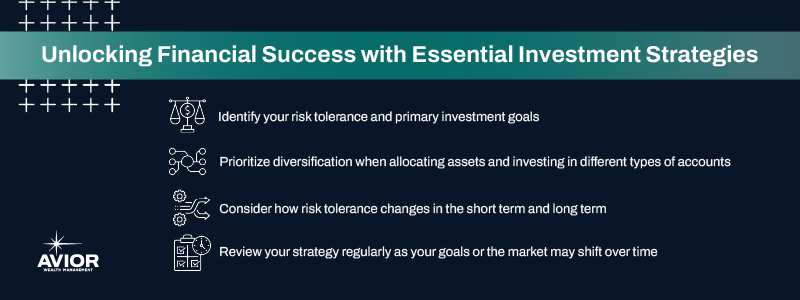Unlocking Financial Success with Essential Investment Strategies
How can you prioritize growth, tax minimization, and low risk with your investments? This guide walks through wealth management strategies to help you unlock financial success.

Achieving your financial goals starts with a dedicated, effective wealth management strategy for saving and investing. With changing tax and financial laws, and all the options you have as an investor, it’s hard to navigate the complex world of investments.
With the right tools and knowledge, you can map out an investment journey that will help you take small steps to reach big goals, laying the groundwork for long-term financial success. This guide walks through top wealth management strategies to achieve the kind of growth and stability you’re looking for.
Identifying investment goals and risk tolerance
These two components go hand-in-hand: your goals and your risk tolerance. Setting clear, actionable, and attainable goals helps you create a strategy that allows you to reach them with measurable steps along the way.
Set investment goals by considering why you’re saving money, what you want your future to look like, and when you’ll need access to this income, such as in retirement. Consider each income stream you have and how that may change in the future.
Bring in any business or professional aspirations, as well as how you’ll support your family, their goals, and your legacy. Goals could also relate to giving money to causes you care about, saving for healthcare expenses later in life, or gifting money to loved ones.
Then, to assess your risk tolerance, ask yourself these questions:
- Am I comfortable taking risks with my money?
- Do I prefer a conservative, moderate, or growth-focused approach?
- When will I need these funds in both the short and long term?
- How will I feel if I lose a lot in a market downturn?
- What kinds of biases and past experiences impact how I feel about risk?
It’s also important to talk to a financial advisor about historical trends in the market and what they mean for the risks you are comfortable taking. Different levels of risk tolerances and varying goals both influence the choices you make in your investment strategy.
Diversification: The key to balancing risk and reward
Ideally, your investment portfolio will include the perfect balance of securing your funds yet seeing substantial growth over time. What “perfect” looks like varies from person to person, depending on the characteristics and factors identified above.
However, all investors can benefit from embracing one important concept: diversification. Just like it sounds, diversifying your investments means you’re investing in different types of accounts and funds. There are a few different asset classes to consider and markets to invest in.
Why is this important? Because the market does swing, and if everything is saved in one area – like the stock market – you could lose everything if it crashes. The real estate market is similar. But, investing in both means you’re putting your money into high-growth opportunities but also spreading out the risk. Carefully considering asset allocation is a must to create the right investment strategy.
You may think the safest option for investing is a standard savings account, which can provide some interest gains. However, investing solely in these places means you could be missing out on the growth that stocks, bonds, or mutual funds provide. That doesn’t mean cash accounts aren’t also valuable to help with diversification – you should consider keeping an emergency fund in a savings account so you can take advantage of its liquidity when you need it.
Long-term versus short-term investment strategies
Throughout your lifetime, your investment strategy will change. Updates may need to be made during life changes like marriage, divorce, having children, adoption, losing loved ones, or dealing with medical problems. In addition, you will probably want to change course when you’re getting closer to retirement.
Short-term investing is often more concerned with preserving capital since you don’t have as much time to recoup losses in the market. Long-term investing, like planning for retirement when you’re still young, allows for more flexibility and potential risk since you have time to recover those losses. As you near retirement, you may decide to take on a more conservative investment approach so you can start protecting what you’ve saved for upcoming withdrawals.
There are benefits to both short-and long-term investment strategies. Remember that taxes also play a role – even if you invest in taxable accounts and risk paying high capital gains tax, if you hold investments in the account for more than a year, you can reduce your rate to long-term capital gains tax (0%, 15%, or 20%), instead of short-term, which will be the same as your tax bracket rate.
With long-term investing options, like 401(k)s and IRAs, you have more opportunity to take advantage of tax benefits, either deferring the tax until retirement with traditional accounts or paying tax on contributions and enjoying tax-free withdrawals later.
Regular review and adjustment of your investment portfolio
Because so much can change in your life and the plans you make, regularly reviewing your portfolio and adjusting your strategy may be necessary. Your financial goals could shift, and probably will over time. Market conditions also change, which will impact your strategies.
Seeking professional advice ensures you’re not trying to do it all on your own. Financial experts understand what’s happening with the market and how you can minimize your tax liability with better investment decisions.
Incorporating the right investment strategies with Avior
Being proactive about investment management means considering tax implications, aligning strategies with your financial goals, and working with a professional for expert guidance through any type of market.
The team at Avior Wealth Management can help you identify goals, plan for both short- and long-term financial needs, and prioritize tax planning to minimize your liability.
Contact our team today to get started with a financial professional.
Disclaimer: Nothing contained herein should be construed as legal or tax advice. Avior and our Advisors will work with your attorney and/or tax professional to assist with your legal and tax strategies. Please consult your attorney or tax professional with specific legal and/or tax questions. Investment Management and Financial Planner are offered through Avior Wealth Management, LLC, an SEC-registered investment advisor. Past performance is not a guarantee of future results. Investments are subject to loss, including the loss of principal.
No Comments
Sorry, the comment form is closed at this time.




